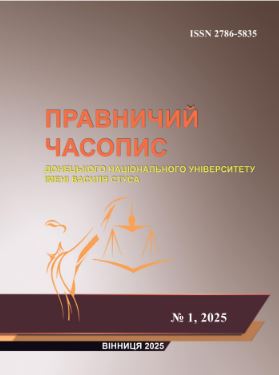Organization of Local Self-Government in Spain: Experience for Ukraine
DOI:
https://doi.org/10.31558/2786-5835.2025.1.5Keywords:
Constitution, Constitution of Spain, local self-government in Spain, models of local self-government, constitutional and legal regulation, reform of local self-government, decentralization of power, separation of powers, forms of interaction of local self-government bodies with state and regional authorities, municipal system, local democracyAbstract
The article examines the current issues of finding the optimal constitutional model of local self-government, determining the legal foundations of its organization and guaranteeing it, taking into account the processes of European integration and decentralization of public power and an attempt was made to conduct a comprehensive systematic study of foreign experience in the legal regulation of local self-government, especially in the countries of continental Europe, namely in Spain.
The optimal model for any country is considered to be one that was formed taking into account historical prerequisites and takes into account its own traditions along with classical models. In many countries, the formation of relations between the center and the regions occurs on the basis of a combination of features inherent in different models of local self-government, which is due to various factors, namely: the system of governance, the features of administrative / state control; administrative-territorial structure; forms of interaction of local communities with the center, etc.
One of the characteristic features of local self-government as a legal phenomenon is that even within the borders of one state there are many features inherent both to the state as a whole and to individual territorial entities within it. The legislator is forced to take into account such features, since this largely determines the successful functioning of the institution of local self-government in the state, therefore, the legislation on local self-government of each state is characterized by the presence of its own, special mechanisms of legal regulation, the implementation and application of which is aimed at achieving the set goal.
Spanish legislation defines a subsidiary procedure for establishing the regulatory framework for the activities of local governments and autonomous communities, which ensures the creation in autonomous communities of mechanisms for the implementation of constitutionally established guarantees for the activities of local self-government bodies and the creation of public authorities based on the constitutional principles of national unity and unified public administration.
The possibility of establishing the specifics of the organization of local self-government for individual territories is provided for by the Spanish Constitution, which establishes a fairly flexible system of local self-government, which allows, if necessary, to expand the powers of autonomous communities regarding the legal regulation of the activities of local governments and contributes to the achievement of one of the main goals of the Spanish Constitution – preserving the territorial integrity of the state.
References
Європейська хартія місцевого самоврядування, прийнята 15 жовтня 1985 року. URL: https://zakon.rada.gov.ua/laws/show/994_036#Text
Конституція Королівства Іспанії. URL: https://legalns.com/download/books/cons/spain.pdf
Гробова В. П. Місцеве самоврядування в Іспанії: особливості та засади функціонування. Науковий вісник Академії муніципального управління: Серія «Право». 2014. № 2. С. 70–77.
Чернеженко О. М. Створення та еволюція автономних громад в Іспанії. Публічне право. 2018. № 2(30). С. 72–80.
Курілов Ю. Ю. Децентралізація влади в Іспанії: самоврядування, регіоналізація та податки Вчені записки ТНУ імені В.І. Вернадського. Серія: Державне управління. 2018. Т. 29(68). № 5. С. 120–129 URL: https://www.pubadm.vernadskyjournals.in.ua/journals/2018/5_2018/23.pdf
Ley 29/1998, de 13 de julio, reguladora de la Jurisdicción Contencioso-administrativa. URL: https://www.boe.es/buscar/pdf/1998/BOE-A-1998-16718-consolidado.pdf
Копил Б. К. Досвід місцевого самоврядування в країнах Європейського союзу. Теорія та практика державного управління. 2010. Вип. 4. С. 154–160. URL: http://nbuv.gov.ua/UJRN/Tpdu_2010_4_25
Лелеченко А. П. Зарубіжний досвід організації функціонування місцевого самоврядування: імплементація в Україні. Державне управління, удосконалення та розвиток. 2011. № 3. С. 266–268. URL: http://www.dy.nayka.com.ua/?op=1&z=266
La transición política. La Constitución de 1978 y el Estado de las Autonomías. 2005. URL: http://www.historiasiglo20.org/HE/16a-1.htm

